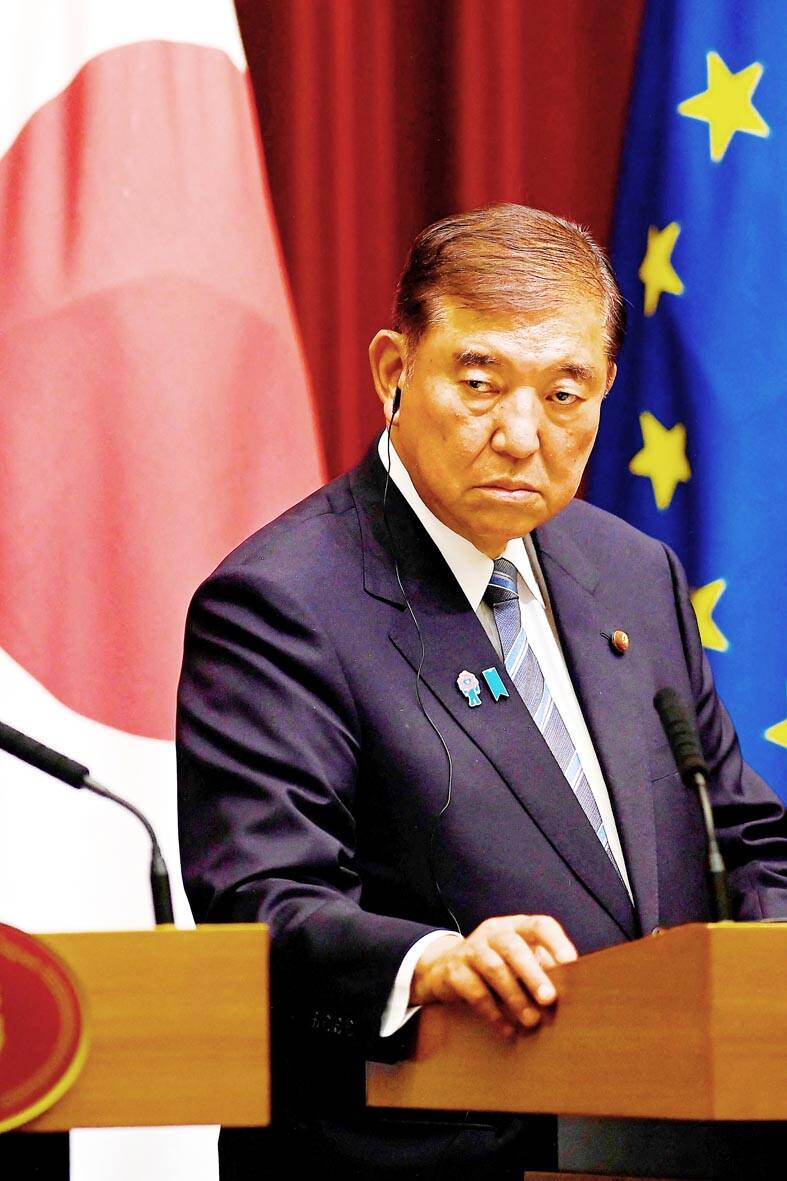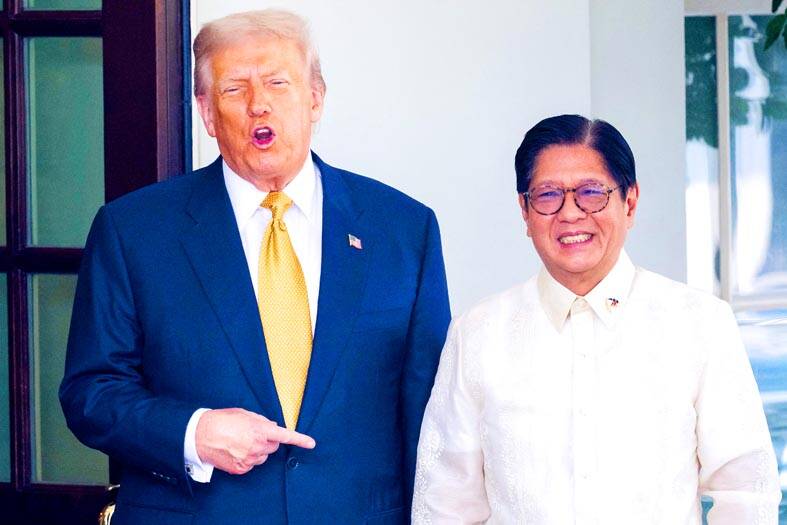US President Donald Trump on Tuesday announced a “massive” trade deal with Japan, including a tariff rate of 15 percent, as a deadline looms for other major US trade partners to strike agreements before the end of this month.
Trump also agreed to reduce threatened tariffs on the Philippines, but only by 1 percentage point, after what he termed a successful meeting with Philippine President Ferdinand Marcos Jr.
In an attempt to slash his country’s colossal trade deficit, Trump has vowed to hit dozens of countries with punitive “reciprocal” tariffs if they do not hammer out a pact with Washington by Friday next week.

Photo: Reuters
The Japan agreement, along with another pact with the Philippines, means Trump has now secured five agreements.
The others were with the UK, Vietnam and Indonesia, which the White House on Tuesday said would ease critical mineral export restrictions.
“We just completed a massive Deal with Japan, perhaps the largest Deal ever made,” Trump wrote on Truth Social.

Photo: AFP
He said that under the deal, “Japan will invest, at my direction, US$550 Billion Dollars into the United States, which will receive 90 percent of the Profits.”
He did not provide further details on the plan, but said it “will create Hundreds of Thousands of Jobs.”
Japanese exports to the US were already subject to a 10 percent tariff, which would have risen to 25 percent on Aug. 1 without a deal.
Duties of 25 percent on Japanese vehicles — an industry accounting for 8 percent of Japanese jobs — were also already in place, plus 50 percent on steel and aluminum.
Japanese Prime Minister Shigeru Ishiba yesterday said that the autos levy had been cut to 15 percent, sending Japanese automaker stocks soaring.
The Nikkei 225 rose 3.5 percent.
“We are the first [country] in the world to reduce tariffs on automobiles and auto parts, with no limits on volume,” Ishiba told reporters.
“By protecting what needs to be protected, we continued the negotiations with an aim to reach an agreement that meets the national interest of both Japan and the United States,” he added.
However, Japanese Minister of State for Economic and Fiscal Policy Ryosei Akazawa, who secured the deal in Washington, said that the 50 percent tariffs on steel and aluminum would remain.
Akazawa also said increased defense spending by Japan was not part of the agreement.
Trump also said that levies on the Philippines would be cut by 1 percentage point to 19 percent after hosting Marcos.
Welcoming Marcos to the White House, Trump called him a “very tough negotiator” and said: “We’re very close to finishing a trade deal — a big trade deal, actually.”
“It was a beautiful visit, and we concluded our Trade Deal, whereby The Philippines is going OPEN MARKET with the United States, and ZERO Tariffs,” Trump wrote on Truth Social.
The 19 percent rate is still above the 17 percent threatened by Trump in April.
Marcos’ press secretary Claire Castro told a news conference in Manila yesterday that the Philippine president had confirmed Trump’s zero tariffs statement, but only for “certain markets.”
Castro also downplayed the potential effects of a tariff regime, saying that just 16 percent of the country’s exports go to the US, with about two-thirds being electronic components not subject to the levies.
“To put it plainly, it has an impact on the country, but not that much,” she told reporters.

A magnitude 7.0 earthquake struck off Yilan at 11:05pm yesterday, the Central Weather Administration (CWA) said. The epicenter was located at sea, about 32.3km east of Yilan County Hall, at a depth of 72.8km, CWA data showed There were no immediate reports of damage. The intensity of the quake, which gauges the actual effect of a seismic event, measured 4 in Yilan County area on Taiwan’s seven-tier intensity scale, the data showed. It measured 4 in other parts of eastern, northern and central Taiwan as well as Tainan, and 3 in Kaohsiung and Pingtung County, and 2 in Lienchiang and Penghu counties and 1

FOREIGN INTERFERENCE: Beijing would likely intensify public opinion warfare in next year’s local elections to prevent Lai from getting re-elected, the ‘Yomiuri Shimbun’ said Internal documents from a Chinese artificial intelligence (AI) company indicated that China has been using the technology to intervene in foreign elections, including propaganda targeting Taiwan’s local elections next year and presidential elections in 2028, a Japanese newspaper reported yesterday. The Institute of National Security of Vanderbilt University obtained nearly 400 pages of documents from GoLaxy, a company with ties to the Chinese government, and found evidence that it had apparently deployed sophisticated, AI-driven propaganda campaigns in Hong Kong and Taiwan to shape public opinion, the Yomiuri Shimbun reported. GoLaxy provides insights, situation analysis and public opinion-shaping technology by conducting network surveillance

Taiwan is gearing up to celebrate the New Year at events across the country, headlined by the annual countdown and Taipei 101 fireworks display at midnight. Many of the events are to be livesteamed online. See below for lineups and links: Taipei Taipei’s New Year’s Party 2026 is to begin at 7pm and run until 1am, with the theme “Sailing to the Future.” South Korean girl group KARA is headlining the concert at Taipei City Hall Plaza, with additional performances by Amber An (安心亞), Nick Chou (周湯豪), hip-hop trio Nine One One (玖壹壹), Bii (畢書盡), girl group Genblue (幻藍小熊) and more. The festivities are to

Auckland rang in 2026 with a downtown fireworks display launched from New Zealand’s tallest structure, Sky Tower, making it the first major city to greet the new year at a celebration dampened by rain, while crowds in Taipei braved the elements to watch Taipei 101’s display. South Pacific countries are the first to bid farewell to 2025. Clocks struck midnight in Auckland, with a population of 1.7 million, 18 hours before the famous ball was to drop in New York’s Times Square. The five-minute display involved 3,500 fireworks launched from the 240m Sky Tower. Smaller community events were canceled across New Zealand’s